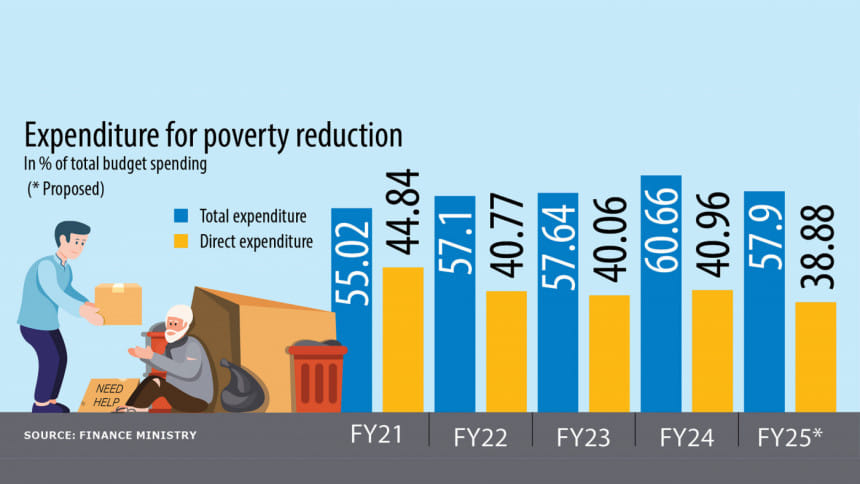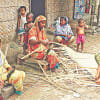Budget Infocus: Direct spending on poverty reduction shrinks

The share of the total allocation for spending directly on poverty reduction has come down for the upcoming fiscal year despite persistently higher inflation, deepening the uncertainties of the poor.
Finance Minister Abul Hassan Mahmood Ali proposed a budget of Tk 797,000 crore for FY25, of which 57.9 percent is slated to be spent on poverty alleviation.
The government plans to spend 38.88 percent of the total expenditure to directly fight poverty, down 2.08 percentage points from the revised expenditure of FY24, according to data from the finance ministry.
Another 19.02 percent of the total expenditure will aim to alleviate poverty indirectly.
The target was set at a time when the country has been witnessing inflation at over 9 percent for nearly two years, forcing people to struggle to keep their heads above water.
Analysts also raised questions about the proper utilisation of the poverty allocation and how it works towards poverty alleviation.
"As a large number of people are still fighting poverty, the allocation should not be cut at all," said Mustafa K Mujeri, executive director at the Institute for Inclusive Finance and Development (InM).
Allocations on paper cannot lead to poverty reduction. Rather, how the funds are being used for the poor should be highly scrutinised, he said.
"For years, the government has been providing over half of the total allocation to poverty. But we don't see outcomes," he said.
Echoing those sentiments, Prof Selim Raihan, executive director of the South Asian Network on Economic Modeling, said: "If the allocation would work really, no poverty would exist in Bangladesh at all."
According to the "Household Income and Expenditure Survey 2022" of the Bangladesh Bureau of Statistics (BBS), the poverty rate in Bangladesh declined to 18.7 percent and the extreme poverty rate stood at 5.6 percent.
However, the country's think-tanks claimed the persisting higher inflation has pushed many new ones under the poverty line.
Raihan suggested focusing financing into three major channels that could help reduce or eliminate poverty, namely employment generation, economic growth and social protection.
Apart from that, social spending on education, health and rural development would indirectly contribute to alleviating poverty, he said.
He added that he did not find anything coherent in the allocation for the Anti-Corruption Commission, Planning Commission, Statistics and Informatics Division, Bangladesh Public Service Commission, or Implementation Monitoring and Evaluation Division.
"I don't know how such allocations would help policy-making for poverty reduction," Raihan said.
The government should conduct a sophisticated analysis of the allocation for ministries and properly assess whether those allocations have been working to alleviate poverty over the years, he said.
Asked whether poverty reduction had any connection to the divisions and ministries, Mujeri said: "Poverty has various dimensions. It is not only limited to people's income."
For example, if good governance can be ensured, it will help poverty reduction.
Additionally, income inequality has been rising in Bangladesh over the years, Mujeri indicated.
According to recent data released by the BBS, Bangladesh's Gini coefficient, the economic measure of equality, stood at 0.499 in 2022, which is alarmingly high.
The Gini coefficient is measured on a scale of 0 to 1. The closer it is to 1, the higher the inequality in society. If it is closer to 0.50, it is considered as manifesting high rates of inequality.
So, the current allocation does not ensure benefits for the poor. It is instead benefitting influential people, he said.
"We are achieving higher growth. But a large part of the poor are still out of the benefits," Mujeri said.

 For all latest news, follow The Daily Star's Google News channel.
For all latest news, follow The Daily Star's Google News channel. 









Comments